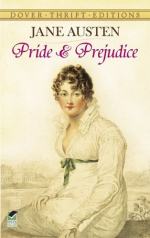|
This section contains 563 words (approx. 2 pages at 300 words per page) |

|
Pride and Prejudice: An Evaluation of Natures
Summary: The conversations between Elizabeth and Darcy in Jane Austen's "Pride and Prejudice" reflect a disregard for Victorian-era social classes, but also serve as verbal swordplay between the characters, a type of intellectual game that challenges them and brings them closer together.
In a novel that describes a town crazed with the superficial qualifications for marriage, Elizabeth and Darcy offer contrast, not only by ignoring the boundaries of social class but also by analyzing the follies of each other. Darcy is attracted to Elizabeth, but he is not interested in her display of grace and beauty while walking about the room. He is instead more eager to divulge himself into conversation with her. Though the discussion in chapter eleven uniquely describes disposition, it is marked by the characters' previous feelings of each other. Stemming from a flirtatious exchange, the subsequent conversation is marked with Darcy's subtle desire for Elizabeth, and her unrelenting disdain for him. After a lengthy debate of each other's personal faults, neither Darcy nor Elizabeth choose to correctly articulate each other's nature, yet they both do, overtly, understand each other perfectly.
At the end of chapter eleven...
|
This section contains 563 words (approx. 2 pages at 300 words per page) |

|


